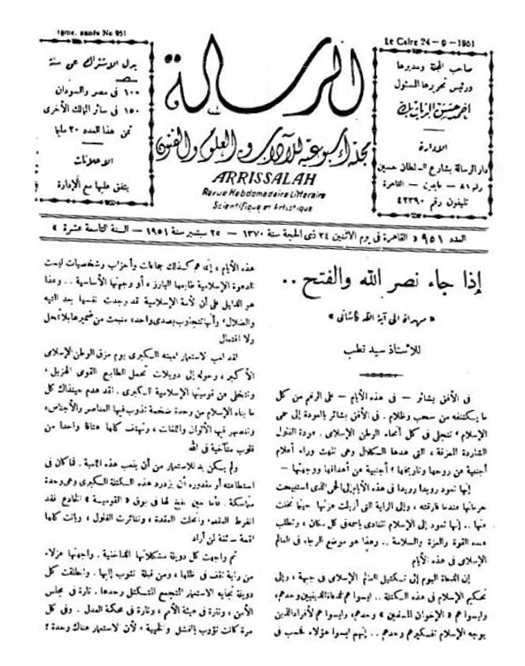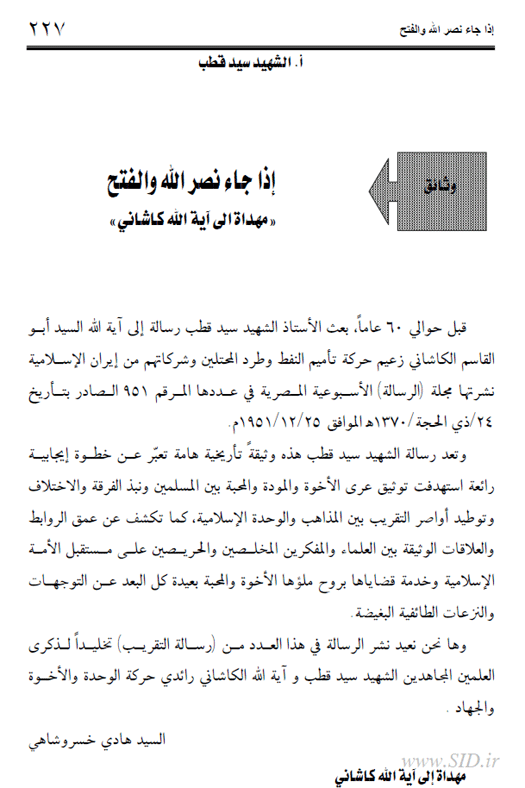|
Sayyid Qutb and Nearness With Rafidees: Ayatollah Kashani of Iran
Posted by Abu.Iyaad, Editor in General Topics: Sayyid Qutb • Nawab Safawi • Rafidah • Shi'ah |

Qutb's Open Letter of Support to Ayatollah Kashani
Here is a scan of the original publication (ar-Risaalah) in which the letter was published in 1951.
The title is "When the support and victory (granted by) Allaah comes" and a subtitle is "Dedicated to Ayatollah Kashani."
The editor of the Shi'ite magazine, Haadee Khasrooshaahee, writes in article, introducing Qutb's letter as follows:
Translation:
Sixty years ago, the Ustaadh, Shaheed[*] Sayyid Qutb sent a message to Ayatollah al-Sayyid Abu al-Qasim al-Kashani, the leader of the Harakah Ta'meem al-Naft (Movement to Nationalize Petroleum) and to expel the occupiers and their companies from Islamic Iran, and it was published by the Egyptian weekly magazine "al-Risalah" in edition no. 951 released on 24th Dhul Hijjah 1370 (25/12/1951). And the letter of al-Shaheed[*] Sayyid Qutb is an important historical documentary (piece of) evidence that is an expression of the positive, excellent step whose aim was to strengthen the bonds of brotherhood, love and affection between the Muslims and throw aside separation and differing and to cement the bonds of nearness between the various schools (of thought) and of Islamic unity. Just as it also reveals the depth of strong ties and connections between the sincere scholars and thinkers (who are) eager for the future of the Islamic Ummah, and (for) aiding the issues (affecting it) with a spirit filled with brotherhood and love, far removed from any detestable factionalist orientations. And here we will reproduce the distribution of the letter in this edition of "Risaalah al-Taqreeb" in order to perpetuate the remembrance of two notable mujaahideen, al-Shaheed[*] Sayyid Qutb and Ayatollah Kashani, the two leaders of the movement for unity, brotherhood and Jihaad.
[*] Declaring a person as "shaheed" in such a way, is incorrect and impermissible, it can only be applied to the one whom the Messenger (sallallaahu alayhi wasallam) testified for or whom the whole ummah has united upon, that he is a shaheed (fatwa of Shaykh Ibn Uthaymeen).
Comments and Notes:
Umar al-Tilmisani, the third supreme leader of al-Ikhwan al-Muslimeen wrote in his book "Dhikriyaat, Laa Mudhakkaaraat" (p. 131), (كان طلبة الإخوان يحتفلون بذكرى نواب صفوي رئيس جمعية فدائيان إسلام الشيعية في إيران), "The students of al-Ikhwaan used to celebrate the mention of Nawab Safawi, the leader of the Jam'iyyah Fedaa'iyaan Islaam al-Shi'iyyah in Iraan." He also said in the same book, (ولم تفتر علاقة الإخوان بزعماء الشيعة فاتصلوا بآية الله الكاشاني واستضافوا في مصر نواب صفوي ، كل هذا فعله الإخوان لا ليحملوا الشيعة على ترك مذهبهم ! ، و لكنهم فعلوه لغرض نبيل يدعو إليه إسلامهم وهو محاولة التقريب بين المذاهب الإسلامية إلى أقرب حد ممكن), "And the connection between the Ikhwaan and the leaders of the Shi'ah did not slacken. They connected with Ayatallaah Kashani, and they invited Nawab Safawi to Egypt (hosting him as a guest). All of this was done by Ikhwaan not in order to make the Shi'ah leave their madhhab but they did this with a noble objective which their Islam called them to, which is to try and bring closeness between the Islamic madhhabs to the closest level possible."
What al-Tilmisani is alluding here is Sayyid Qutb reaching out to both Nawab Safawi and Ayatollah Kashani. In 1953 the Muslim Brotherhood invited Nawab Safawi to Egypt, and we have pictures of this Rafidee with Sayyid Qutb on that occasion. That there should exist this type of cordiality, love, friendship, affection (as described by the editor of "Risaalah al-Taqreeb") between Sayyid Qutb and the Raafidah is not very surprising because Sayyid Qutb made takfir of Mu'awiyah, his parents (Abu Sufyan and Hind) and the Companions from Banu Umayyah. He also belittled Uthman (radiallaahu anhu) - and all of this was due to a Marxist, Socialist reading of Islamic history. Qutb was poisoned by Western (European) materialist philosophies before turning to Islam and that poison came through in his books (Social Justice in Islam, Battle Between Islam and Capitalism). Another Rafidee, Ayatollah Khamenei was very impressed by Sayyid Qutb and his writings and he initiated a translation of one of his works, and in the 1970s Qutbs revolutionary ideas were instrumental, along with those of Ali Shariati, in aiding the Iranian revolution. Sayyid Qutb himself was influenced by the writings of Abu A'la Mawdudi who also had that Rafidee poison towards Mu'awiyah and the Banu Umayyah and Abu A'laa Mawdudi was a very close friend of Ayatollah Khomeini as indicated by his own son who wrote a book on the subject of the close relationship between the two. Mawdudi praised the Iranian revolution as a true Islamic revolution. Further, Khomeini was also a good friend of Nawab Safawi (who was executed in 1956 for an assassination attempt on Hussain Alaa, a minister in the government) and they had history together.
When you stand back a little and just take a look at all these names, Ayatollah Kashani, Ayatollah Khomeini, Nawab Safawi, Ayatollah Khamenei, Sayyid Qutb and Abu A'laa Mawdudi you are seeing the synthesis of Rafd and Kharijiyyah. Namely, the original hatred, resentment, takfir, and revolution against the Companions of Allaah's Messenger initiated by the activities of one Abdullah bin Saba' al-Yahudi who raised the flag of "social justice" and roused up the vagabonds and criminals leading to the assassination of Uthmaan (radiallaahu anhu) and subsequently leading to all the tribulations.
Be not surprised then that Khomeini, Khamenei, Nawab Safawi, Kashani and Sayyid Qutb all held the belief that Mu'awiyah and the Banu Umayyah were kafirs and all of them have that revolutionary, kharijee methodology and we see the same slogans coming from them all, "Imaamah" (leadership) "Haakimiyyah", "jaahiliyyah" (Mawdudi, Qutb and Nawaba Safawi all outlined this doctrine), "al-Adaalah al-Ijtimaa'iyyah" (Social Justice).
It would be wise for you to remember that historically, Rafd has ties to Khaarijiyyah since both these innovations were borne out of the activities of the Sab'iyyah, Abdullah bin Saba' and his followers. Qutb actually praised the revolution of Abdullah bin Saba' against Uthmaan (radiallahu anhu), stating that it was an outburst of the true Islamic spirit, even though he acknowledged it was a plot by Abdullah bin Saba' (see here, here). So the hearts of these people are all the same. You see the same ideological poison running through their veins, hearts and minds, and you see them all cordial with each other, whilst attacking the choicest of Companions, indeed the writer of revelation, Mu'awiyah (radiallaahu anhu).
Link to this article: Show: HTML Link • Full Link • Short Link
Share or Bookmark this page: You will need to have an account with the selected service in order to post links or bookmark this page.






Related Articles:
Add a Comment
- The Baatinee Movements, Secret Organizations, Al-Ikhwaan, Al-Qaidah and ISIS: Part 1 - There Is No Secrecy or Secret Organization in Islaam
- Saed Rageah: The Rafidah Shi'ah of Iran and the Islamic Shariah
- Shaykh Rabee: The Destructive Freemasonic Principles and Protocols of Al-Ikhwan Al-Muslimeen
- Sayyid Qutb and Nearness With Rafidees: Ayatollah Kashani of Iran
- Sayyid Qutb and Nearness With Rafidees: Nawab Safawi Al-Shi'iyy
- Hassan Al-Banna: Meeting With Raafidees Muhammad Al-Qummee and Ayatollah Kashani
- Hasan Al-Banna: Unity With the Raafidah Shiah and Unification of the Sects
- Hasan Al-Banna: Ahl Us-Sunnah and the Shiah Are the Same, Upon Purity, United by the Kalimah
You must be registered and logged in to comment.
| Key Topics | |
| al-fakihani • al-izz bin abd al-salam • al-masalih al-mursalah • al-maslahah al-mursalah • al-mawlid al-nabawi • al-mawlid-al-nabawi • al-nawawi • al-shaatibee • al-shafi'i • al-shatibi • baatiniyyah • bidah haqiqiyyah • bidah hasanah • bidah idafiyyah • fatimids • funerals • good innovation • hajj • ibn hajar • mawlid • misbahah • mother's day • niyaahah • niyyah • prayer • public interest • qur'an • rosary beads • shaking hands • shiah • sunnah hasanah • tabarruk • talbiyyah • tasbeeh beads • ubaydiyyah • | |





